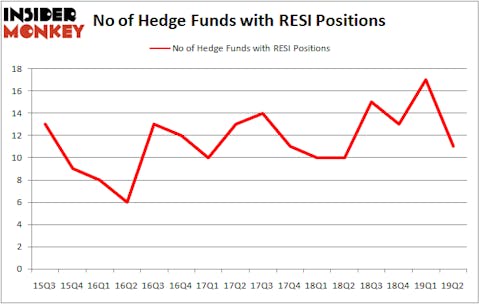We are still in an overall bull market and many stocks that smart money investors were piling into surged through October 17th. Among them, Facebook and Microsoft ranked among the top 3 picks and these stocks gained 45% and 39% respectively. Hedge funds’ top 3 stock picks returned 34.4% this year and beat the S&P 500 ETFs by 13 percentage points. Investing in index funds guarantees you average returns, not superior returns. We are looking to generate superior returns for our readers. That’s why we believe it isn’t a waste of time to check out hedge fund sentiment before you invest in a stock like Front Yard Residential Corporation (NYSE:RESI).
Front Yard Residential Corporation (NYSE:RESI) was in 11 hedge funds’ portfolios at the end of the second quarter of 2019. RESI has seen a decrease in activity from the world’s largest hedge funds in recent months. There were 17 hedge funds in our database with RESI holdings at the end of the previous quarter. Our calculations also showed that RESI isn’t among the 30 most popular stocks among hedge funds (see the video below).

Video: Click the image to watch our video about the top 5 most popular hedge fund stocks.
Hedge funds’ reputation as shrewd investors has been tarnished in the last decade as their hedged returns couldn’t keep up with the unhedged returns of the market indices. Our research has shown that hedge funds’ small-cap stock picks managed to beat the market by double digits annually between 1999 and 2016, but the margin of outperformance has been declining in recent years. Nevertheless, we were still able to identify in advance a select group of hedge fund holdings that outperformed the market by 40 percentage points since May 2014 through May 30, 2019 (see the details here). We were also able to identify in advance a select group of hedge fund holdings that underperformed the market by 10 percentage points annually between 2006 and 2017. Interestingly the margin of underperformance of these stocks has been increasing in recent years. Investors who are long the market and short these stocks would have returned more than 27% annually between 2015 and 2017. We have been tracking and sharing the list of these stocks since February 2017 in our quarterly newsletter.

Unlike former hedge manager, Dr. Steve Sjuggerud, who is convinced Dow will soar past 40000, our long-short investment strategy doesn’t rely on bull markets to deliver double digit returns. We only rely on hedge fund buy/sell signals. Let’s take a look at the key hedge fund action encompassing Front Yard Residential Corporation (NYSE:RESI).
What have hedge funds been doing with Front Yard Residential Corporation (NYSE:RESI)?
Heading into the third quarter of 2019, a total of 11 of the hedge funds tracked by Insider Monkey were bullish on this stock, a change of -35% from the first quarter of 2019. On the other hand, there were a total of 10 hedge funds with a bullish position in RESI a year ago. So, let’s find out which hedge funds were among the top holders of the stock and which hedge funds were making big moves.

More specifically, Shoals Capital Management was the largest shareholder of Front Yard Residential Corporation (NYSE:RESI), with a stake worth $11 million reported as of the end of March. Trailing Shoals Capital Management was Millennium Management, which amassed a stake valued at $7.3 million. Balyasny Asset Management, Snow Park Capital Partners, and GLG Partners were also very fond of the stock, giving the stock large weights in their portfolios.
Due to the fact that Front Yard Residential Corporation (NYSE:RESI) has faced declining sentiment from the smart money, we can see that there is a sect of money managers who sold off their full holdings last quarter. Interestingly, Ken Griffin’s Citadel Investment Group sold off the biggest position of all the hedgies watched by Insider Monkey, comprising about $3.2 million in stock. Leon Cooperman’s fund, Omega Advisors, also cut its stock, about $1.9 million worth. These transactions are intriguing to say the least, as total hedge fund interest fell by 6 funds last quarter.
Let’s now review hedge fund activity in other stocks similar to Front Yard Residential Corporation (NYSE:RESI). We will take a look at NextDecade Corporation (NASDAQ:NEXT), Hersha Hospitality Trust (NYSE:HT), Verso Corporation (NYSE:VRS), and McEwen Mining Inc (NYSE:MUX). This group of stocks’ market valuations match RESI’s market valuation.
| Ticker | No of HFs with positions | Total Value of HF Positions (x1000) | Change in HF Position |
|---|---|---|---|
| NEXT | 9 | 535292 | 2 |
| HT | 12 | 23778 | 0 |
| VRS | 22 | 138980 | -2 |
| MUX | 4 | 2443 | -1 |
| Average | 11.75 | 175123 | -0.25 |
View table here if you experience formatting issues.
As you can see these stocks had an average of 11.75 hedge funds with bullish positions and the average amount invested in these stocks was $175 million. That figure was $44 million in RESI’s case. Verso Corporation (NYSE:VRS) is the most popular stock in this table. On the other hand McEwen Mining Inc (NYSE:MUX) is the least popular one with only 4 bullish hedge fund positions. Front Yard Residential Corporation (NYSE:RESI) is not the least popular stock in this group but hedge fund interest is still below average. This is a slightly negative signal and we’d rather spend our time researching stocks that hedge funds are piling on. Our calculations showed that top 20 most popular stocks among hedge funds returned 24.4% in 2019 through September 30th and outperformed the S&P 500 ETF (SPY) by 4 percentage points. Unfortunately RESI wasn’t nearly as popular as these 20 stocks (hedge fund sentiment was quite bearish); RESI investors were disappointed as the stock returned -4.2% during the third quarter and underperformed the market. If you are interested in investing in large cap stocks with huge upside potential, you should check out the top 20 most popular stocks among hedge funds as many of these stocks already outperformed the market so far in 2019.
Disclosure: None. This article was originally published at Insider Monkey.





